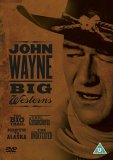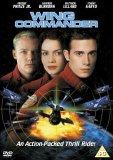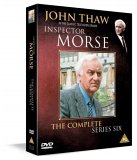![George And Mildred - The Movie [1980]](/pictures/1015421.jpg) George And Mildred - The Movie | DVD | (17/02/2003)
from £5.08
| Saving you £4.91 (96.65%)
| RRP
George And Mildred - The Movie | DVD | (17/02/2003)
from £5.08
| Saving you £4.91 (96.65%)
| RRP George and Mildred are the ultimate odd couple the popular landlord and landlady from Man About The House who became a household name with Thames Television in the 1970's and 80's. Mildred is vain snobbish and domineering; George is shy timid frigid and henpecked. Together they make a great partnership! In this feature length movie Mildred is still trying to steer him towards romance; George still doesn't know what she's driving at...
![John Wayne Box Set (Undefeated/The Comancheros/The North to Alaska/The Big Trail) [DVD]](/pictures/1152508.jpg) John Wayne Box Set (Undefeated/The Comancheros/The North to Alaska/The Big Trail) | DVD | (01/10/2012)
from £14.98
| Saving you £N/A (N/A%)
| RRP
John Wayne Box Set (Undefeated/The Comancheros/The North to Alaska/The Big Trail) | DVD | (01/10/2012)
from £14.98
| Saving you £N/A (N/A%)
| RRP Box-set featuring four classic John Wayne movies. 'The Big Trail' (1930) was Wayne's first starring role. He plays the young leader of a pioneer wagon train travelling across the Oregon Trail. Repulsing Indian attacks and battling against the hostile elements, The Duke still finds time for romance with a fellow traveller (Marguerite Churchill). In 'The Comancheros (1961), Wayne stars as Texas Ranger Jake Cutter whose path crosses with that of professional gambler Paul Regret (Stuart Whitman). The two become uneasy bedfellows in their quest to crush a powerful outlaw gang who are selling arms and alcohol to the local Indians. This was director Michael Curtiz's last film and also stars Lee Marvin and Ina Balin. 'North to Alaska' (1960) is a lighthearted Western starring Wayne and Stewart Granger as rough and tumble gold prospectors in Alaska. When Sam McCord (Wayne) and George Pratt (Granger) eventually strike it rich in the gold rush, George sends Sam to Seattle to fetch his fiancee; but Sam falls in love with her. George eventually accepts his loss and sets about finding a new gal, but only seems to find trouble. In 'The Undefeated' (1969), Confederate Colonel James Langdon (Rock Hudson) prepares to travel to Mexico with his family. When they are attacked by bandits, Union Colonel J.H. Thomas (Wayne) comes to their aid. The former enemies find themselves united in their efforts to resist Mexican Emperor Maximillian, and Juarez, the rebel leader. When the rebels kidnap the Southerners, Colonel Thomas must decide whether to surrender his valuable herd of 3,000 horses and secure their release, or leave them to their fate.
![Fight Club - Single Disc Edition [1999]](/pictures/1001386.jpg) Fight Club - Single Disc Edition | DVD | (05/07/2004)
from £8.25
| Saving you £9.74 (118.06%)
| RRP
Fight Club - Single Disc Edition | DVD | (05/07/2004)
from £8.25
| Saving you £9.74 (118.06%)
| RRP Every weekend in the basements and car parks of bars across the country, young men with good white-collar jobs and absent fathers take off their shoes and shirts and fight each other barehanded just as long as they have to.
![The Rose [1979]](/pictures/1019835.jpg) The Rose | DVD | (06/05/2002)
from £9.43
| Saving you £3.56 (37.75%)
| RRP
The Rose | DVD | (06/05/2002)
from £9.43
| Saving you £3.56 (37.75%)
| RRP Bette Midler plays a Janis Joplin-like singer overwhelmed by stardom and its excesses. Mark Rydell (On Golden Pond) directs what is a kind of hybrid showcase for Midler's concert talents and a standard pop biopic, with the usual rhythms of desire, success, betrayal, failure, and such. Alan Bates is the best thing about the movie as the Rose's ruthless manager, and Harry Dean Stanton and Frederic Forrest add some interesting seasoning. But as a whole, the film can't rise above its mixed purposes or clichés. --Tom Keogh
![Sirocco [1951]](/pictures/1002864.jpg) Sirocco | DVD | (27/01/2003)
from £6.55
| Saving you £6.44 (98.32%)
| RRP
Sirocco | DVD | (27/01/2003)
from £6.55
| Saving you £6.44 (98.32%)
| RRP In 1925 Damascus Harry Smith (Bogart) runs guns to the rebels under Emir Hassan. The French arrest him along with others and force him to sell weapons to them where hHe develops an dangerous interest in French intelligence officer Feroud's mistress Violette...
![Fight Club - 2-disc Special Edition [1999]](/pictures/1002642.jpg) Fight Club - 2-disc Special Edition | DVD | (03/05/2004)
from £8.00
| Saving you £14.99 (187.38%)
| RRP
Fight Club - 2-disc Special Edition | DVD | (03/05/2004)
from £8.00
| Saving you £14.99 (187.38%)
| RRP All films require a certain suspension of disbelief, Fight Club perhaps more than others; but if you're willing to let yourself get caught up in the anarchy, this film, based on the novel by Chuck Palahniuk, is a modern-day morality play warning of the decay of society. Edward Norton is the unnamed protagonist, a man going through life on cruise control, feeling nothing. To fill his hours, he begins attending support groups and 12-step meetings. True, he isn't actually afflicted with the problems, but he finds solace in the groups. This is destroyed, however, when he meets Marla (Helena Bonham Carter), also faking her way through groups. Spiralling back into insomnia, Norton finds his life is changed once again, by a chance encounter with Tyler Durden (Brad Pitt), whose forthright style and no-nonsense way of taking what he wants appeal to our narrator. Tyler and the protagonist find a new way to feel release: they fight. They fight each other, and then as others are attracted to their ways, they fight the men who come to join their newly formed Fight Club. Marla begins a destructive affair with Tyler, and things fly out of control, as Fight Club is transformed into a nationwide fascist group. The depiction of violence in Fight Club is unflinching, but director David Fincher's film is captivating and beautifully shot, with camerawork and effects that are almost as startling as the script. The movie is packed with provocative ideas and images--from the satirical look at the emptiness of modern consumerism to quasi-Nietzschean concepts of "beyond good and evil"--that will leave the viewer with much food for thought to take away. Pitt and Norton are an unbeatable duo, and the film has a great sense of humour too. Even if it leaves you with a sense of profound discomfort this is a movie that you'll have to see again and again, if for no other reason than to just to take it all in. --Jenny Brown, Amazon.com
![Cold Blood Legacy (DVD) [2019]](/pictures/1149962.jpg) Cold Blood Legacy (DVD) | DVD | (02/09/2019)
from £3.49
| Saving you £N/A (N/A%)
| RRP
Cold Blood Legacy (DVD) | DVD | (02/09/2019)
from £3.49
| Saving you £N/A (N/A%)
| RRP Starring Jean Reno (Leon: The Professional) Cold Blood Legacy is a gripping thriller that will keep you guessing until the credits roll. Henry is a legendary hitman enjoying the isolation of his lakeside cabin deep within the vast wilderness of the Rocky Mountains. When the solitude of his well-earned retirement is shattered by the arrival of Melody (Sarah Lind), the survivor of a dramatic accident, Henry must decide whether to risk his own life to save hers but is Melody really who she says she is, and was her arrival really a coincidence?
 Big Trail, The / The Comancheros / North To Alaska / The Undefeated | DVD | (31/05/2005)
from £N/A
| Saving you £N/A (N/A%)
| RRP
Big Trail, The / The Comancheros / North To Alaska / The Undefeated | DVD | (31/05/2005)
from £N/A
| Saving you £N/A (N/A%)
| RRP Four classic John Wayne films are featured on this fantastic box set. The Big Trail: John Wayne hits the pioneer trail in his first feature film. Starring as the leader of a wagon trail he battles through tough terrain and Indian attacks and learns of love and friendship in this sweeping Western epic! The Comancheros: John Wayne is a Texas Ranger in this rollicking good humored western assigned to bring an arms-running gang to justice. After Wayne arrests one of the
 Wing Commander | DVD | (03/01/2005)
from £12.99
| Saving you £N/A (N/A%)
| RRP
Wing Commander | DVD | (03/01/2005)
from £12.99
| Saving you £N/A (N/A%)
| RRP At the edge of our universe all hell is about to break loose. A vicious alien race the Kilrathi has discovered the coordinates to Earth and is heading there with plans for its total destruction. Now all that stands between Earth and this new breed of enemy are two young hotshot fighter pilots and their elite fighter squadron on the battleship Tiger Claw. It's an all-out race against time as they engage the Kilrathi in a final desperate attempt to prevent them from reaching Earth s
![The Big Trail [1930]](/pictures/1000568.jpg) The Big Trail | DVD | (18/04/2005)
from £4.20
| Saving you £10.05 (341.84%)
| RRP
The Big Trail | DVD | (18/04/2005)
from £4.20
| Saving you £10.05 (341.84%)
| RRP In this sweeping pioneer adventure a courageous young scout leads hundreds of settlers across treacherous cliffs through brutal snowstorms Indian attacks and buffalo stampedes to their destiny out west. Along the way he loses his heart to a beautiful pioneer woman and never stops trying to win her love. Tyrone Power co-stars in this visually spectacular epic from Raoul Walsh.
 Inspector Morse - Series 6 | DVD | (21/02/2005)
from £25.63
| Saving you £-0.64 (N/A%)
| RRP
Inspector Morse - Series 6 | DVD | (21/02/2005)
from £25.63
| Saving you £-0.64 (N/A%)
| RRP This box set features the entire sixth series of the classic British Television drama Inspector Morse. Episodes comprise: 1. Dead On Time: Morse becomes deeply involved when a Don apparently commits suicide. The man's wife Susan was once engaged to Morse who makes no secret of the fact that he is still in love with her... 2. Happy Families: A wealthy industrialist is murdered yet his family seem uninterested until a second murder occurs... 3. The Death
![The Stranger [1946]](/pictures/1042880.jpg) The Stranger | DVD | (07/03/2005)
from £N/A
| Saving you £N/A (N/A%)
| RRP
The Stranger | DVD | (07/03/2005)
from £N/A
| Saving you £N/A (N/A%)
| RRP The Stranger, according to Orson Welles, "is the worst of my films. There is nothing of me in that picture. I did it to prove that I could put out a movie as well as anyone else." True, set beside Citizen Kane, Touch of Evil, or even The Trial, The Stranger is as close to production-line stuff as the great Orson ever came. But even on autopilot Welles still leaves most filmmakers standing. The shadow of the Second World War hangs heavy over the plot. A war crimes investigator, played by Edward G Robinson, tracks down a senior Nazi, Franz Kindler, to a sleepy New England town where he's living in concealment as a respected college professor. The script, credited to Anthony Veiller but with uncredited input from Welles and John Huston, is riddled with implausibilities: we're asked to believe, for a start, that there'd be no extant photos of a top Nazi leader. The casting's badly skewed, too. Welles wanted Agnes Moorehead as the investigator and Robinson as Kindler, but his producer, Sam Spiegel, wouldn't wear it. So Welles himself plays the supposedly cautious and self-effacing fugitive--and if there was one thing Welles could never play, it was unobtrusive. What's more, Spiegel chopped out most of the two opening reels set in South America, in Welles' view, "the best stuff in the picture". Still, the film's far from a write-off. Welles' eye for stunning visuals rarely deserted him and, aided by Russell Metty's skewed, shadowy photography, The Stranger builds to a doomy grand guignol climax in a clock tower that Hitchcock must surely have recalled when he made Vertigo. And Robinson, dogged in pursuit, is as quietly excellent as ever. On the DVD: not much in the way of extras, except a waffly full-length commentary from Russell Cawthorne that tells us about the history of clock-making and where Edward G was buried, but precious little about the making of the film. Print and sound are acceptable, but though remastering is claimed, there's little evidence of it. --Philip Kemp
 Epoch | DVD | (10/02/2003)
from £9.96
| Saving you £0.03 (0.30%)
| RRP
Epoch | DVD | (10/02/2003)
from £9.96
| Saving you £0.03 (0.30%)
| RRP Across the planet sudden increases in earthquake activity is causing massive damage and worldwide panic. Mason Rand (David Keith) a young nuclear weapons expert is recruited by the President's science advisor to investigate some additional strange activity over the giant Himalayan mountains. With the Earth's life support system in the balance Rand and his team fly to Bhutan to join a top secret U.S. task force. What they discover will change man's view of history forever...
 Fight Club - Two Disc Set (1999) | DVD | (06/11/2000)
from £12.94
| Saving you £5.05 (39.03%)
| RRP
Fight Club - Two Disc Set (1999) | DVD | (06/11/2000)
from £12.94
| Saving you £5.05 (39.03%)
| RRP Every weekend in the basements and car parks of bars across the country, young men with good white-collar jobs and absent fathers take off their shoes and shirts and fight each other barehanded just as long as they have to.
 The Fenn Street Gang - Series 1 - Complete | DVD | (29/10/2007)
from £N/A
| Saving you £N/A (N/A%)
| RRP
The Fenn Street Gang - Series 1 - Complete | DVD | (29/10/2007)
from £N/A
| Saving you £N/A (N/A%)
| RRP This sitcom was a spin-off from Please Sir it follows the activities of the pupils of Form 5C after leaving Fenn Street School.
![Ku Klux Klan - A Secret History [DVD]](/pictures/1115715.jpg) Ku Klux Klan - A Secret History | DVD | (11/06/2012)
from £13.48
| Saving you £-3.49 (-34.90%)
| RRP
Ku Klux Klan - A Secret History | DVD | (11/06/2012)
from £13.48
| Saving you £-3.49 (-34.90%)
| RRP Discover the rituals and rites at the dark heart of America's most controversial organisation.At times, it has been among the most powerful and largest fraternal organizations in America, boasting up to four million members. It has survived for more than a century by wrapping its doctrine of hate and intolerance around the sacred cloth of Christianity and the fabric of American patriotism.The Ku Klux Klan: A Secret History goes beyond the flaming crosses and beneath the robes, to reveal the dark heart of this controversial organisation.
![Erasing David [DVD]](/pictures/1103950.jpg) Erasing David | DVD | (06/12/2010)
from £6.98
| Saving you £11.00 (220.44%)
| RRP
Erasing David | DVD | (06/12/2010)
from £6.98
| Saving you £11.00 (220.44%)
| RRP ERASING DAVID is the feature film debut from writer/director David Bond, a fascinating documentary about the meaning of privacy - and the loss of it.
![The Stranger [1946]](/pictures/1012865.jpg) The Stranger | DVD | (18/03/2002)
from £N/A
| Saving you £N/A (N/A%)
| RRP
The Stranger | DVD | (18/03/2002)
from £N/A
| Saving you £N/A (N/A%)
| RRP The Stranger, according to Orson Welles, "is the worst of my films. There is nothing of me in that picture. I did it to prove that I could put out a movie as well as anyone else." True, set beside Citizen Kane, Touch of Evil, or even The Trial, The Stranger is as close to production-line stuff as the great Orson ever came. But even on autopilot Welles still leaves most filmmakers standing. The shadow of the Second World War hangs heavy over the plot. A war crimes investigator, played by Edward G Robinson, tracks down a senior Nazi, Franz Kindler, to a sleepy New England town where he's living in concealment as a respected college professor. The script, credited to Anthony Veiller but with uncredited input from Welles and John Huston, is riddled with implausibilities: we're asked to believe, for a start, that there'd be no extant photos of a top Nazi leader. The casting's badly skewed, too. Welles wanted Agnes Moorehead as the investigator and Robinson as Kindler, but his producer, Sam Spiegel, wouldn't wear it. So Welles himself plays the supposedly cautious and self-effacing fugitive--and if there was one thing Welles could never play, it was unobtrusive. What's more, Spiegel chopped out most of the two opening reels set in South America, in Welles' view, "the best stuff in the picture". Still, the film's far from a write-off. Welles' eye for stunning visuals rarely deserted him and, aided by Russell Metty's skewed, shadowy photography, The Stranger builds to a doomy grand guignol climax in a clock tower that Hitchcock must surely have recalled when he made Vertigo. And Robinson, dogged in pursuit, is as quietly excellent as ever. On the DVD: not much in the way of extras, except a waffly full-length commentary from Russell Cawthorne that tells us about the history of clock-making and where Edward G was buried, but precious little about the making of the film. Print and sound are acceptable, but though remastering is claimed, there's little evidence of it. --Philip Kemp
![Edward G. Robinson - Scarlet Street / The Stranger [1946]](/pictures/1012864.jpg) Edward G. Robinson - Scarlet Street / The Stranger | DVD | (18/03/2002)
from £N/A
| Saving you £N/A (N/A%)
| RRP
Edward G. Robinson - Scarlet Street / The Stranger | DVD | (18/03/2002)
from £N/A
| Saving you £N/A (N/A%)
| RRP In a way, Scarlet Street is a remake. It's taken from a French novel, La Chienne (literally, "The Bitch") that was first filmed by Jean Renoir in 1931. Renoir brought to the sordid tale all the colour and vitality of Montmartre; Fritz Lang's version shows us a far harsher and bleaker world. The film replays the triangle set-up from Lang's previous picture, The Woman in the Window, with the same three actors. Once again, Edward G Robinson plays a respectable middle-aged citizen snared by the charms of Joan Bennett's streetwalker, with Dan Duryea as her low-life pimp. The plot closes around the three of them like a steel trap. This is Lang at his most dispassionate. Scarlet Street is a tour de force of noir filmmaking, brilliant but ice-cold. The Stranger, according to Orson Welles, "is the worst of my films. There is nothing of me in that picture". But even on autopilot Welles still leaves most filmmakers standing. A war crimes investigator, played by Edward G Robinson, tracks down a senior Nazi to a sleepy New England town where he's living in concealment as a respected college professor. Welles wanted Agnes Moorehead as the investigator and Robinson as the Nazi Franz Kindler, but his producer, Sam Spiegel, wouldn't wear it. So Welles himself plays the supposedly cautious and self-effacing fugitive--and if there was one thing Welles could never play, it was unobtrusive. Still, the film's far from a write-off. Welles' eye for stunning visuals rarely deserted him and, aided by Russell Metty's skewed, shadowy photography, The Stranger builds to a doomy grand guignol climax in a clocktower that Hitchcock must surely have recalled when he made Vertigo. And Robinson, dogged in pursuit, is as quietly excellent as ever. On the DVD: sparse pickings. Both films have a full-length commentary by Russell Cawthorne which adds the occasional insight, but is repetitive and not always reliable. The box claims both print have been "fully restored and digitally remastered", but you'd never guess. --Philip Kemp
![The Stranger [1946]](/pictures/1013342.jpg) The Stranger | DVD | (18/10/1999)
from £4.99
| Saving you £8.00 (160.32%)
| RRP
The Stranger | DVD | (18/10/1999)
from £4.99
| Saving you £8.00 (160.32%)
| RRP The legendary story that hovers over Orson Welles' The Stranger is that he wanted Agnes Moorehead to star as the dogged Nazi hunter who trails a war criminal to a sleepy New England town. The part went to Edward G. Robinson, who is marvellous, but it points out how many compromises Welles made on the film in an attempt to show Hollywood he could make a film on time, on budget and on their own terms. He accomplished all three, turning out a stylish if unambitious film noir thriller, his only Hollywood film to turn a profit on its original release. Welles stars as unreformed fascist Franz Kindler, hiding as a schoolteacher in a New England prep school for boys and newly married to the headmaster's lovely if naive daughter (Loretta Young). Welles, the director, is in fine form for the opening sequences, casting a moody tension as agents shadow a twitchy low-level Nazi official skulking through South American ports and building up to dramatic crescendo as Kindler murders this little man, the lovely woods becoming a maelstrom of swirling leaves that expose the body he furiously tries to bury. The rest of the film is a well designed but conventional cat-and-mouse game featuring an eye-rolling performance by Welles and a thrilling conclusion played out in the dark clock tower that looms over the little village. --Sean Axmaker

Please wait. Loading...
This site uses cookies.
More details in our privacy policy